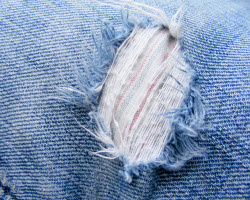Repair This: at what point is it better to buy something new?
 Here’s a question that’s been I’ve been wondering about for a while: at what point is it better to buy something new than keep repairing something old?
Here’s a question that’s been I’ve been wondering about for a while: at what point is it better to buy something new than keep repairing something old?
On this site, we’re all about reducing & repairing – not buying things new for the sake of it or because they’re a bit scuffed & dirty – but with many things, you reach a point of diminishing returns and it feels like you’re throwing good money/time/resources after bad: at some point you have to make a decision to replace it. I suspect the precise point where that occurs depends very much on the item but I wondered what you think about when you’re deciding whether to repair or replace.
Is it a question of your skills? the item’s repairability? availability/affordability of new parts? its not-just-financial value? Other factors?
I’d love to hear your thoughts on this.
























It should go down the chain! If it is no longer useful or valuable to you–chances are there is someone who will take it off your hands! Creative reuse-upcycle-downcycle. Learn more on this topic http://www.planetpalsblog.com :)
Yes, I was imagining things would be reused not for their original purpose after the point of replacement. That’s what this website is all about ;)
If repair will cost more than aa new thing-buy new.
Firstly it is hard to get repair parts locally and then it sometimes takes weeks plus shipping to get them. I have a hay fork that needs a new handle, but I can buy a new one cheaper than a handle. This can’t be right. But I will buy the handle anyway because I’d rather be green. So my answer is it depends on whether I can afford to repair it and whether I can find the parts.
Energy efficient items are another pet peeve. They supposedly pay for themselves over and over again in reduced energy usage, but such a waste of a perfectly good and often working item. And why “get rid” of a working item by giving it away and the whole problem isn’t mine anymore.
Many questions, few answers.
I do not have a darning bulb like my mom had to darn socks, but I learned to be frugal from my early years. My sewing machine and sewing box still get good use. I still sew on buttons that fall off. My mom was the one who gave me her sewing machine and my parents have both given me clothes to mend. Also, another example, when I personally had a pair of jeans with a hole in them, I patched a heart patch over the hole and it looked cute. (The heart patch was scavenged and saved from another garment that was retired.) But the jeans eventually wore out and I cut them up for rags for my dad on his farm. I only have one pair of jeans that I ever bought that have lasted (color and material) for decades. Farmers and mechanics can always use rags. Now I have found a really good cleaner in the last year, so I am cleaning stains from clothes that I had stopped wearing but had not tossed away. So I am still saving clothes.
Sewing is not hard to learn. A new younger friend found out I could sew and commandeered me to teach her some basics and she has blossomed with excitement for the skill and become quite a seamstress. People in church give me things to sew, too. I do not ask for payment. But if they want to give me something, I let them fulfill their joy and give it to me.
So, if it can be fixed, go on and fix it. I support anyone who tries to fix, rather than toss, things. We waste far too much in this country and in these days we live in. But I know that skill is a big qualifier. But if you don’t know how to fix it yourself, hang onto it for a while. Be thoughtful. There is probably someone you know who can fix it or tell you how. Everyone has different skills.
lyn–
would love to know what the great stain remover you found was. : -) thx
I’ve traditionaly gotten rid of things when the repair cost/convenience was much more than replacement cost. But I’ve also tried to re-purpose old things for new uses.
I’m eagerly anticipating a great product called Sugru from the UK. It was recently launched in small quantities and can be used to repair a multitude of items. Can’t wait until they ramp up production and start selling it! I already have a list of things to repair with it.
It really depends on what’s being recycled.
I have several pairs of boots that have now cost more to resole and reheel than they cost to buy, but I can’t throw them away, they still have lots of life left in them, and they are comfortable.
I also have a bag that I am desperately trying to save, but it’s not looking good! It’s a great colour and size and was given to me, it’s not proving cheap trying to repair it!
None of us would be visiting this site if we simply threw things away that could be repaired, there are no right and wrong answers, just decisions that we have to live with.
I like to think that it is not about how long it takes to repair something, but that you repair it because it still has value to you as a useable item – either because you really like it, or it might be hard to replace, or even because the quality of the item can’t be found any longer. Sure, it might take you longer to repair it than it would cost to buy a new item, but buying a new item every time we have something broken is part of what has caused our environmental mess. And even if it did get to the point where you’ve decided “new” is the right answer, hopefully that “new” to you, is perhaps someone else’s “old”.
This is for Terri who wanted to know my great stain remover find. This is not something bought in stores. If you check out my website, this is the product that has changed my life and also proven over and over to clean not only your body, but it is also kills fungus and mold and on and on. I came onto this just over a year ago and use it with great pleasure, satisfaction and trust. It has certainly won me.
I would really like to hear some ideas on how people repurpose things.
There does come a time when repair is actually less environmentally sound than replacement, but that doesn’t mean the old item has to be thrown out.